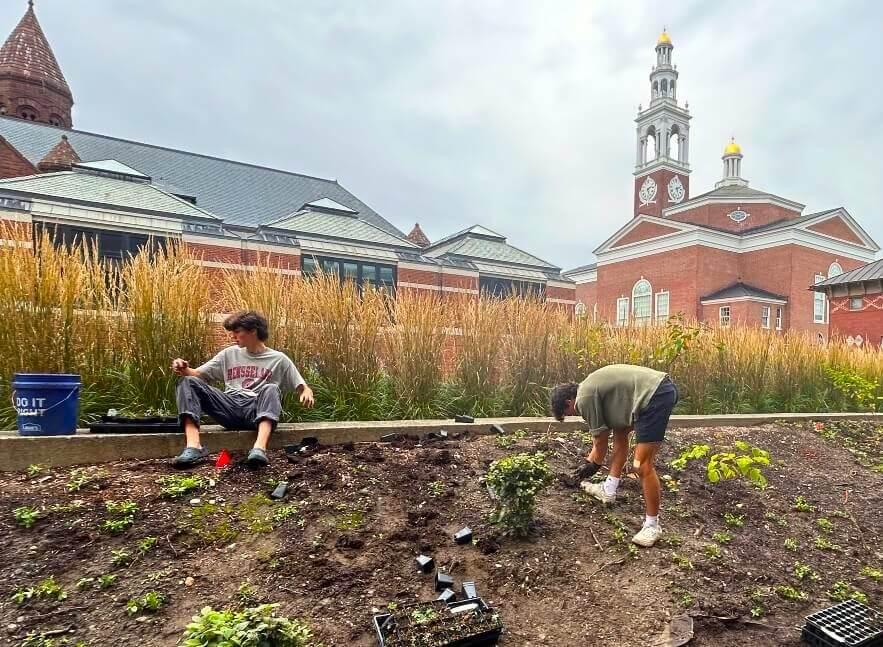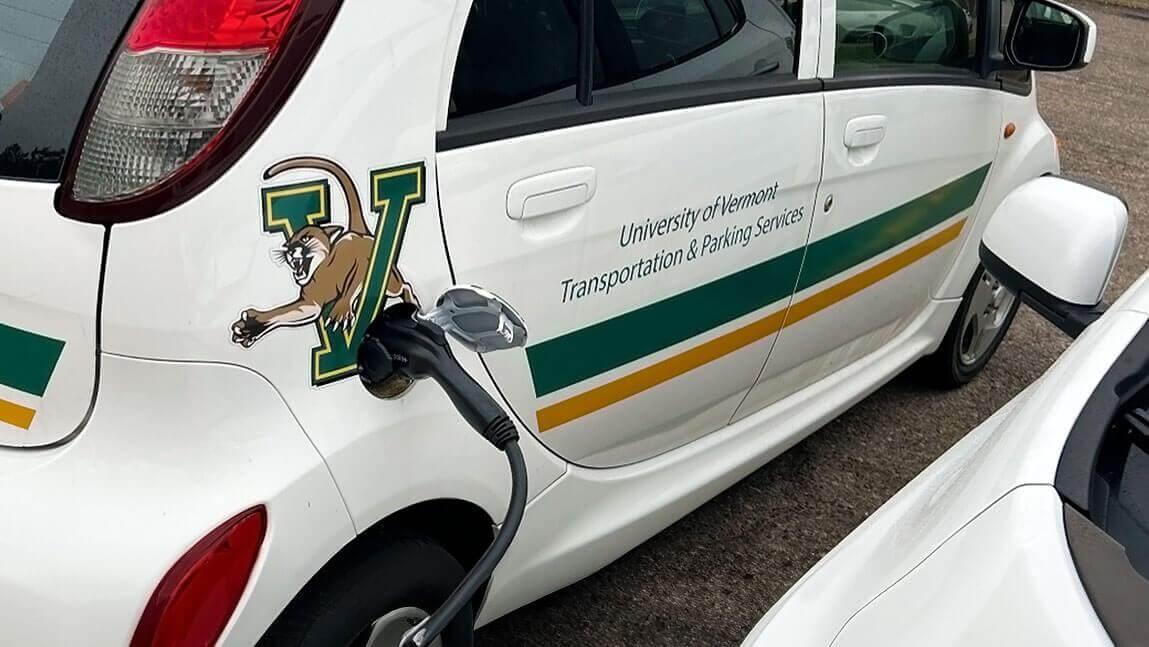The Comprehensive Sustainability Plan (CSP) focuses and engages the campus community and generates interest among internal and external stakeholders. Most importantly, the CSP outlines short- and long-term goals that are achievable and within the financial capacity of the institution. The development of UVM’s Comprehensive Sustainability Plan will help guide the institution over the next ten years and beyond to create a better world through responsible stewardship of all of our resources.
The goals of the plan are organized around four major themes:
- Decarbonization
- Operations
- Governance and People
- Research and Learning

Comprehensive Sustainability Plan
Consistent with Our Common Ground, the University of Vermont’s Comprehensive Sustainability Plan promotes just, equitable sustainability solutions by connecting world class research and academics to University operations.
Complete Plan (PDF) 2025 Progress Report (PDF) 2024 Progress Report (PDF)Progress on the CSP goals
Decarbonization
Energy and climate
GOAL: Carbon neutral by 2030.
PROGRESS: A new greenhouse gas inventory website increases transparency and makes information more accessible for research and learning.
Key campus partners are participating in AASHE’s Decarbonization Academy to learn new strategies for reaching carbon neutrality.
In 2024, two geothermal test wells were drilled to investigate the feasibility of geothermal energy on campus.
GOAL: Reduce greenhouse gas emissions 60% below 2007 levels by 2024.
PROGRESS: This goal has been achieved. UVM purchases Vermont carbon offsets from the Vermont Land Trust to cover our Scope 3 emissions.
Buildings
GOAL: Reduce GHG emissions in major university buildings.
PROGRESS: In 2024, a boiler reprogramming project at the Main District Energy Plant was completed and is estimated to reduce building thermal emissions across campus by about 4%. Steam meters in multiple buildings have been replaced to improve data collection on individual building heating use. Multiple energy studies are underway to identify effective measures for further reducing campus emissions from high-energy use buildings.
GOAL: Increase energy efficiency in laboratory buildings.
PROGRESS: In 2024, Stafford Hall was connected to chilled water from our Main District Energy Plant, replacing inefficient refrigerant coils. This project is expected to reduce electricity use by 610,000 kWh annually, and is comparable to the annual electricity consumption of about 90 Vermont homes.
Transportation
GOAL: Reduce GHG emissions associated with the UVM fleet.
PROGRESS: UVM’s fleet now includes 35 EVs, with 10 added in the past year. A new fleet permit fee (launched Jan 2025) encourages EV adoption, vehicle downsizing, and interdepartmental sharing. UVM is leveraging incentives to expand fleet charging infrastructure to 56 fleet-specific ports: 16 ports at UVM Rescue, 28 at BioResearch, and 12 at the Wheeler House.
GOAL: Reduce conventional single-occupancy vehicle commutes from 2019 baseline.
PROGRESS: In 2023, UVM added two new covered and secured bike parking shelters accommodating over 100 bikes and in 2024 added a third CarShare Vermont vehicle on campus.
Charging access for EV commuters has expanded with 26 ports now available for UVM affiliates. New housing closer to campus and updates to the proximate zone map support sustainable travel choices. UVM ridership on GMT has surpassed pre-pandemic levels, and the 2024 CATMA survey data shows a strong increase in sustainable commuting choices.
GOAL: Implement the EV Charging Campus Plan.
PROGRESS: UVM is undertaking the largest EV charging station expansion in Vermont, with a 400% increase in campus charging capacity. Recent and upcoming installations include 119 new EV ports (25 in 2024 and 94 upcoming) across locations like BioResearch, Centennial, Leahy, and Wheeler House.
Operations
Food and dining
GOAL: Increase spending on Vermont-grown food to 25% by 2030.
PROGRESS: UVM Dining continues to advance this goal through new local partnerships with Stewarts Bakery, Burlington Bagels, and Miller Farm. In Fall 2024, 20.9% of food met the local food definition.
In Spring 2025, Dining launched the Local Meets Global series, hosting seven pop-ups in dining halls with local entrepreneurs in conjunction with cultural heritage months.
Waste
GOAL: Reduce total pounds of waste generated per campus user 10% by 2035 from FY19 baseline.
PROGRESS: In FY24, overall waste generation (trash, compost and recycling combined) decreased by more than 220 tons from the FY19 baseline, indicating progress in waste reduction efforts.
In 2024, UVM Dining expanded reuse initiatives with the launch of ReusePass, a mobile app that improved access to the EcoWare program. Participation increased by 63%, diverting 48,000 single-use containers from the landfill, with a 98% return rate. Reusable cups were also introduced in four retail locations during the spring 2025.
UVM was the first public university to end the sale of bottled water in 2013 and in 2025 reaffirmed that commitment in University policy.
GOAL: Increase composting and recycling by a combined 10% or more by 2035 from FY19 baseline.
PROGRESS: A pilot program to collect organics on the upper floors of residence halls has yielded successful results and will be expanded in fall 2025.
Nine new labs have begun participating in lab recycling programs.
A comprehensive waste characterization study has been completed which will identify additional materials for diversion from the waste stream.
Landscape
GOAL: Prioritize the purchase of electric grounds management equipment.
PROGRESS: In 2024, UVM Grounds purchased 2 electric mowers and 29 units of electric handheld equipment, including trimmers, blowers, saws, and shears.
GOAL: Increase the square feet of sustainable and native plantings on campus.
PROGRESS: UVM completed a comprehensive mapping and evaluation of all garden beds to assess pollinator friendliness, guiding the expansion and enhancement of pollinator and naturalistic gardens across campus. 3000 sf of additional naturalistic gardens were added to campus in 2024.
Governance and People
Inclusive Excellence
GOAL: Support the implementation of Inclusive Excellence Action Plans within departments across the University.
PROGRESS: The Office of Sustainability actively contributes to the University’s Inclusive Excellence efforts through representation on the University Inclusive Excellence Council.
Governance
GOAL: Implement the CSP and revise the plan on a five-year basis.
PROGRESS: Annual progress report is broadly shared through UVM’s news channels, featured on the Office of Sustainability website, and promoted across social media platforms to increase visibility and campus-wide engagement.
Investments
GOAL: Increase percentage of positive sustainability investments and shareholder advocacy.
PROGRESS: In 2024, the Energy Revolving Fund's payback period criteria was extended from 7 to 15 years to enable further investment in energy efficiency upgrades to campus.
In 2023, UVM increased our investment of operating reserves in socially responsible funds to $30M. UVM's Socially Responsible Investing
Workforce Development
GOAL: Create partnerships with other training and educational institutions to support the development and training of the green workforce in Vermont.
PROGRESS: Physical Plant launched entry-level roles with on-the-job training for high-demand trades, enabling pilot participants to advance from assistant to senior positions within a year; this successful model is now expanding to the building automation controls team.
The Leahy Institute funded the Vermont Rural Water Association and Vermont Energy Action Network to establish partnerships with UVM’s Water Resources Institute and Community Development and Applied Economics (CDAE)’s Public Communications Program (respectively) to implement targeted workforce development initiatives and deepen ties with UVM professors and students in this work.
PACE is now offering a customizable project management class for construction companies and manufacturers in collaboration with local businesses.
Purchasing
GOAL: Improve purchasing practices to increase sustainable purchases across the University.
PROGRESS: The Office of Sustainability now reviews RFPs prior to publication to identify sustainability opportunities. Purchasing Services lists sustainable purchasing resources on their website and has improved tracking systems to establish baseline use of sustainable suppliers and sustainable evaluation criteria.
Research and Learning
Research
GOAL: Strengthen and support transdisciplinary sustainability research across the University.
PROGRESS: In 2024, the Sustainable Campus Fund’s Innovative Research Track award was successfully relaunched for graduate students and the Planetary Health Initiative launched a post doc fellowship and seed grant program.
GOAL: Launch Sustainable Solutions Lab (SSL) and cultivate research that uses campus as a “living lab”.
PROGRESS: The Sustainable Solutions Lab hosted three graduate and one undergraduate student in the first cohort. In its second year, two new undergraduate positions sponsored by the Planetary Health Initiative and Rubenstein School of Environment and Natural Resources (RSENR) were introduced, and the Internal Carbon Pricing intern presented at two national conferences.
Learning
GOAL: Educate students to have a positive impact and contribute to sustainable communities.
PROGRESS: UVM is a leader in sustainability education. The Sustainable Innovation MBA program is ranked as the #1 Better World MBA in the United States.
Eco-Reps designed a sustainable living workshop for the 2025 Healthy Students, Healthy Planet Teach-In hosted by Patrick Leahy Honors College and RSENR.



